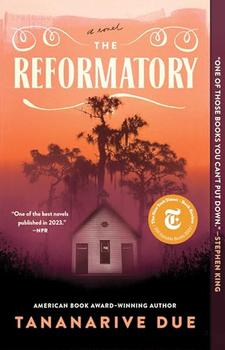Book Club Discussion Questions
In a book club? Subscribe to our Book Club Newsletter!
For supplemental discussion material see our Beyond the Book article, Bringing Them Home: The Use of DNA to Identify Remains at the Dozier School for Boys and our BookBrowse Review of The Reformatory.
Please be aware that this discussion guide will contain spoilers!
- The Reformatory starts out with Robbie Stephens Jr. as simply a young boy who has just lost his mother and is dealing with the absence of his father, who was forced to flee town for his safety. How does the lack of those parental figures impact him? Does grief play a role in helping Robbie, hurting him, or both? In what ways?
-
Reflect on the relationships Robbie has while serving time in the reformatory school. How do they shape and motivate him? What does his friendship with Blue and Redbone provide him? What does his dynamic with the warden provide him?
-
Discuss the need for characters to put on appearances in order to survive. For example, Gloria's character is sometimes accused of "talking white" for speaking properly. Meanwhile, other times she is shown to play dumb and speak more simply, depending on whom she is talking to. Why does Gloria need to do this to accomplish her mission? What are other examples of situations in which characters had to play a role? Can you think of a time you had to adopt a false role to achieve a goal?
-
What role does Christianity and faith play in the story? How does belief in a higher power define the characters and their actions?
-
Throughout the novel, characters interact with or mention real and prominent African American figures from the Jim Crow era, such as Ruby McCollum, Harry T. Moore, and Zora Neale Hurston. How does the inclusion of real heroes of Black history contribute to the story for you? Had you heard of these people before?
-
Robbie and Gloria have powers—Robbie sees haints, Gloria is clairvoyant. These gifts become incredibly useful tools in helping the siblings survive their situations, but they also bring with them a great weight. In what circumstances do their abilities become a burden?
-
Discuss the ways that gender and racism intersect in this story. Robbie and Gloria are both poor Black children, but are they viewed and oppressed differently? What about the experience of white women characters and Black women characters?
-
Throughout the novel we witness Gloria trying anything she can to save her brother, first taking the path of legal representation but then quickly realizing she is trying to fight fair in an unfair system. Why do you think Gloria tries so hard to abide by protocol at first? What are other examples of characters taking matters into their own hands when authority figures fail them?
-
In chapter 8 Gloria thinks, "What was the point of white skin if you couldn't do whatever you put your mind to?" Discuss the characters that aid the Stephens siblings throughout the story: Miss Anne, Mr. Loehmann, Mr. Crutcher, and his sister Mrs. Crutcher Hamilton, among others. Identify the differences in the lengths they are willing to go to in helping. What is holding each character back and what drives them to eventually push past that hesitation or stop helping altogether? Why are some characters more willing to stick their necks out to make progress than others?
-
In the final chapter, Gloria says that "everyone would try to say that only the warden left mauled in the creek had created the unholy suffering at that place, when the whole town had a hand." What does she mean by this?
-
Though The Reformatory takes place in the Jim Crow–era South, does it address any issues in contemporary society? Can you think of any recent court cases similar in which the punishment doesn't fit the crime or the judicial system failed to properly assess the defendant's guilt or innocence?
-
The author's note provides suggestions for supplemental reading that add more context to the themes of juvenile incarceration and the matriculation of Jim Crow–era sentiments in today's systems. Read Burning Down the House: The End of Juvenile Prison by Nell Bernstein or The New Jim Crow by Michelle Alexander and discuss the parallels you find between either book and The Reformatory.
-
One of the few reprieves Robbie has from the horrors of the Reformatory is his time in music class. How was learning to play the trumpet a cathartic experience for him? Discuss the power of music in general as a tool for healing and share a song or piece of music that personally affects you in this way.
Unless otherwise stated, this discussion guide is reprinted with the permission of Simon & Schuster.
Any page references refer to a USA edition of the book, usually the trade paperback version, and may vary in other editions.
For supplemental discussion material see our Beyond the Book article, Bringing Them Home: The Use of DNA to Identify Remains at the Dozier School for Boys and our BookBrowse Review of The Reformatory.
